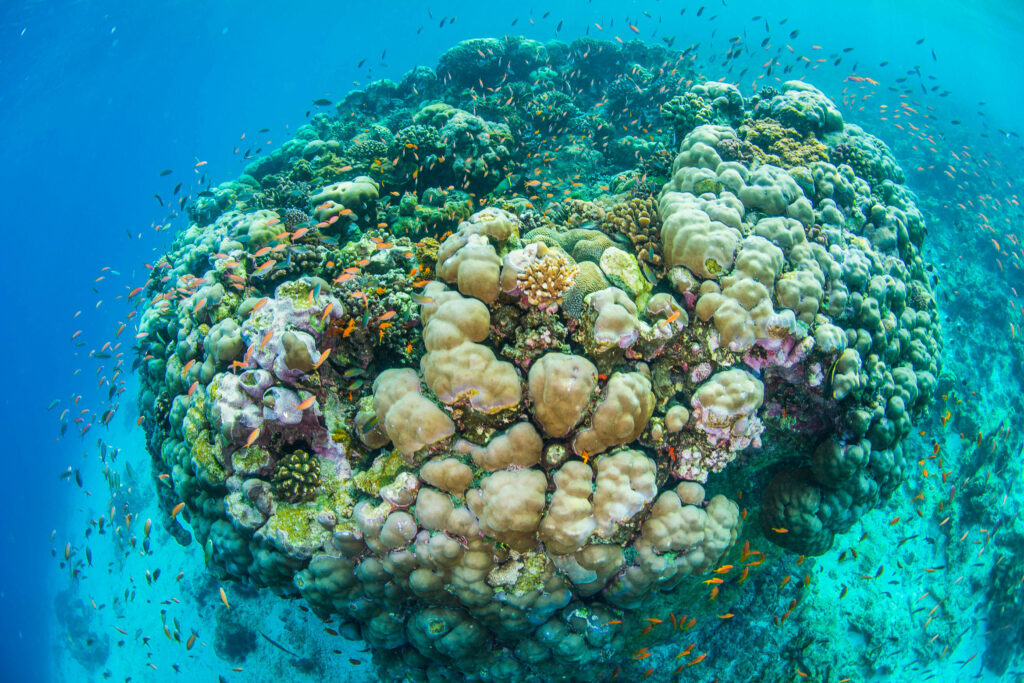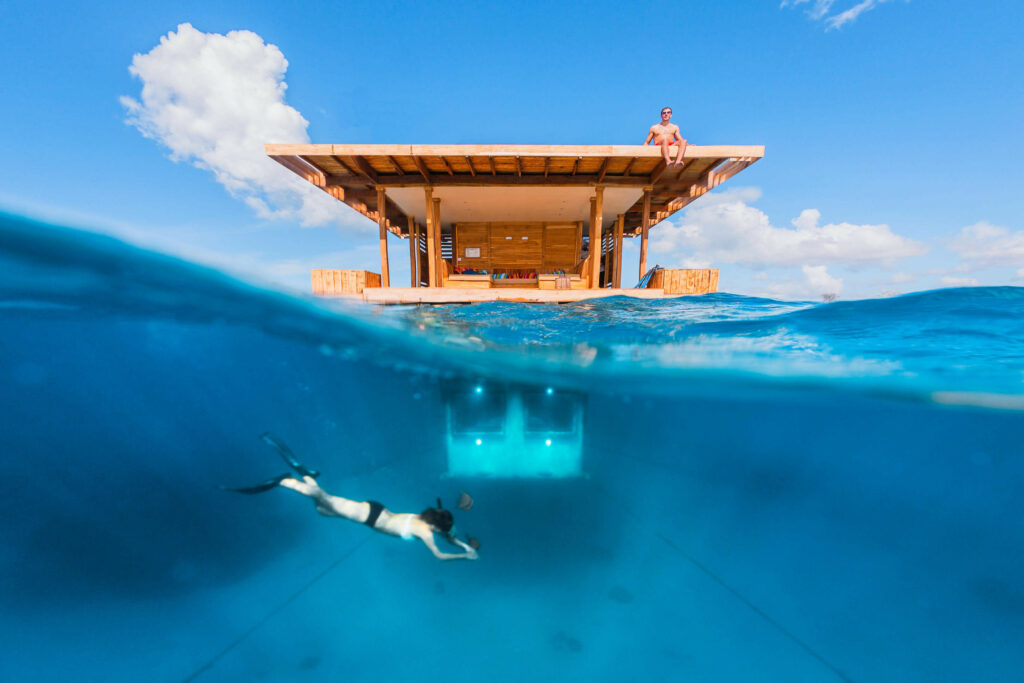The ocean covers 139 million square miles or 70 per cent of the Earth’s surface; three billion people rely on the oceans for their livelihoods, and more than 350 million jobs are linked to oceans worldwide. The ocean also produces 50 per cent of the oxygen we breathe and 80 per cent of the water we drink. Important? We think so. And this World Oceans Day, we want to pay homage to the ecosystem that sustains us all and how it can be protected. World Oceans Day was officially recognized by the United Nations in 2008, with the goal of raising awareness about the importance of our oceans and the role they play in sustaining life on Earth.
At The Manta Resort on Pemba Island, Tanzania, sustainable tourism has collaborated with local communities for the benefit of the people and the planet by protecting its waters. Here, marine wildlife thrives in their Kwanini Marine Conservation area, and you can see all of the success in action through a mask and snorkel or in their dreamlike underwater room.
According to Ocean Panel, coastal and marine tourism represents at least 50 per cent of total global tourism. It constitutes the largest economic sector for most small island developing states and many coastal states. Securing the long-term sustainability and viability of this sector is critical for the continued prosperity of the destinations and communities that rely on it. Key changemakers like The Manta Resort are using tourism to protect surrounding waters in the form of Marine Protected Areas (MPAs)—designated zones for marine conservation that support biodiversity recovery and protection. They are one of the most cost-effective ways to protect marine biodiversity while also supporting a wide range of human activities, according to the United Nations.
The Kwanini Marine Conservation Area

The Kwanini Marine Conservation Area is located directly offshore from The Manta Resort’s pristine stretches of ivory-colored beaches. This is where it’s possible to witness first-hand the success of a conservation economy through sustainable tourism. Schools of angelfish, butterflyfish, and snapper numbering in the thousands swim between confetti-colored corals, completely unphased by divers and snorkelers, while giant clams and octopus go about their day in a protected paradise. The area was established in 2013 through the Kwanini Foundation (the non-profit arm of The Manta Resort), but it didn’t happen overnight.
“Without community buy-in, you have nothing,” explains Matt Saus, managing partner of The Manta Resort and chairman of the Kwanini Foundation. “It’s about involving the local communities from the very beginning, and only then do you build enough trust to foster a relationship that is strong enough to support a conservation direction such as the MPA the Kwanini Foundation has built.”
Kwanini means “why,” and through community consultation and a collaborative direction, the Kwanini Foundation was able to establish trust with islanders by always asking ‘the why’ in a challenge or opportunity and showing why protecting the reef could bring sustainable economic impact in the tourism and fishing industries. Through some unsustainable case studies of neighboring Zanzibar, the direction of less-traveled Pemba Island had an opportunity to lead by example. By establishing trust in the communities first and foremost, the Kwanini Marine Conservation Area was born and is now being noticed from a federal level in what is possible and how to do more of this in Tanzania.
In recent years, fishermen, tourists, and locals have really started to notice the benefits of protecting and patrolling the 0.62 miles of coastline directly in front of The Manta Resort. Within the MPA, a no-take zone has been established, meaning fishing is not permitted. Beyond its boundaries, fishermen are starting to capitalize on the benefits of the “spillover effect.” This is, essentially, when biodiversity in a protected area increases so much that it spills over, allowing fishermen to sustainably catch fish without damaging the ecosystem.
More recently, conservation success stories are centering on two turtle nestings in March 2023, with successful hatches in May.
“This is history in the making,” Matt explained. “Never in our entire time here have we seen turtles nest on this beach, and it means the MPA is working.”
Outside of the MPA, the Kwanini Foundation has several projects on the go that stand to benefit and uplift Pemba Island’s residents and ecosystems. Faced with a serious water shortage in the local Mnarani communities, the Foundation is providing 10,000 liters of water per day by truck until the new pipeline project that is currently under construction is completed. Other in-progress projects include terrestrial conservation, education programs, waste management, and a new entrepreneurship center.
The Underwater Room at Manta Resort

The Manta Resort is most known for its underwater room located inside the Kwanini Marine Conservation Area. About 820 feet from the shore—accessed on a traditionally crafted wooden boat—this one-of-a-kind room allows guests to come face-to-face with protected wildlife such as trumpetfish, lionfish, angelfish, and if you’re lucky, an octopus making its way across the window. The Indian Ocean and Pemba Island are known for crystal-clear waters and incredible visibility, which allow you to see for miles into the depths. At night, turn on underwater lights that surround the perimeter of the room to attract exotic, nocturnal marine life. No matter what time of day or night, the aquarium-like experience is an underwater safari in its own right and can not be found anywhere else in Africa.
Above, in the lounge area, gourmet food, fine wines, pre-made cocktails, and almost any of the luxuries that are enjoyed on the shore are brought to the room. There are three levels, with the lower level submerged four meters below the surface, providing a 360-degree view of the surrounding coral reef and marine life. The room is a custom design from Sweden but beautifully crafted in Tanzania, with a comfortable double bed, lounge area, and a bathroom with a shower.
At night, you have the option to turn on the underwater lights that attract marine life for non-stop entertainment—you might not even want to sleep in case something big swims by. While luxurious upstairs and down, the room is a platform to witness conservation in action for hours without getting wet or needing to come up for air. Why? All of the enthralling aquatic entertainment is seen in crystal clear vision.
The on-shore experience
If you’ve experienced a luxury safari camp elsewhere in Africa, The Manta Resort is that–but on the coast. Fresh-caught sustainable seafood, botanical cocktails, fine wines, and the friendliest staff make you feel right at home. The ocean-view rooms are an open-air concept and boast a private plunge pool. The architecture is uniquely Pemba and Tanzanian-inspired.
Down on the beach, the squeakiest, purest, whitest sand in the clearest waters awaits. If you’re a diver or snorkeler, you’re in the right place; grouper, octopus, barracuda, and schools of reef fish shimmer in the water. If you’re a beachcomber, wander to the beach bar for a sundowner in the swing chairs overlooking the water.
In between activities, take advantage of daily complimentary massages, and don’t forget to bask in the vibrant hues of an Indian Ocean sunset sail aboard a wood dhow boat—a quintessentially Zanzibar and Pemba island experience.
Whether complementing a mainland Tanzania trip or exploring Zanzibar and Pemba Island on a coastal holiday, The Manta Resort and its underwater room provide a marine safari that is the perfect way to start or end a Tanzanian safari.
Plan your Trip
Ready to start planning your own incredible adventure? We make the process stress-free and enjoyable.
